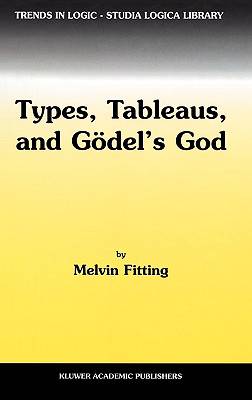
Door een staking bij bpost kan je online bestelling op dit moment iets langer onderweg zijn dan voorzien. Dringend iets nodig? Onze winkels ontvangen jou met open armen!
- Afhalen na 1 uur in een winkel met voorraad
- Gratis thuislevering in België vanaf € 30
- Ruim aanbod met 7 miljoen producten
Door een staking bij bpost kan je online bestelling op dit moment iets langer onderweg zijn dan voorzien. Dringend iets nodig? Onze winkels ontvangen jou met open armen!
- Afhalen na 1 uur in een winkel met voorraad
- Gratis thuislevering in België vanaf € 30
- Ruim aanbod met 7 miljoen producten
Zoeken
€ 153,95
+ 307 punten
Omschrijving
Gödel's modal ontological argument is the centrepiece of an extensive examination of intensional logic. First, classical type theory is presented semantically, tableau rules for it are introduced, and the Prawitz/Takahashi completeness proof is given. Then modal machinery is added, semantically and through tableau rules, to produce a modified version of Montague/Gallin intensional logic. Extensionality, rigidity, equality, identity, and definite descriptions are investigated. Finally, various ontological proofs for the existence of God are discussed informally, and the Gödel argument is fully formalized. Objections to the Gödel argument are examined, including one due to Howard Sobel showing Gödel's assumptions are so strong that the modal logic collapses. It is shown that this argument depends critically on whether properties are understood intensionally or extensionally.
Parts of the book are mathematical, parts philosophical. A reader interested in (modal) type theory can safelyskip ontological issues, just as one interested in Gödel's argument can omit the more mathematical portions, such as the completeness proof for tableaus. There should be something for everybody (and perhaps everything for somebody).
Parts of the book are mathematical, parts philosophical. A reader interested in (modal) type theory can safelyskip ontological issues, just as one interested in Gödel's argument can omit the more mathematical portions, such as the completeness proof for tableaus. There should be something for everybody (and perhaps everything for somebody).
Specificaties
Betrokkenen
- Auteur(s):
- Uitgeverij:
Inhoud
- Aantal bladzijden:
- 181
- Taal:
- Engels
- Reeks:
- Reeksnummer:
- nr. 12
Eigenschappen
- Productcode (EAN):
- 9781402006043
- Verschijningsdatum:
- 31/05/2002
- Uitvoering:
- Hardcover
- Formaat:
- Genaaid
- Afmetingen:
- 159 mm x 251 mm
- Gewicht:
- 458 g

Alleen bij Standaard Boekhandel
+ 307 punten op je klantenkaart van Standaard Boekhandel
Beoordelingen
We publiceren alleen reviews die voldoen aan de voorwaarden voor reviews. Bekijk onze voorwaarden voor reviews.











